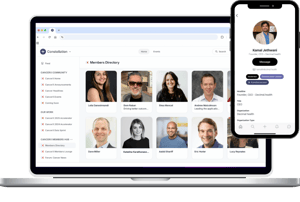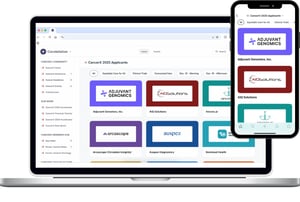
Beyond Clinic Walls: Digital Strategies to Transform the Cancer Experience
Cancer care extends far beyond the clinic walls, creating a critical need for support systems that reach patients where they actually spend most of their time—in their homes and communities. The stark reality is that patients with metastatic breast cancer spend only 7% to 10% of their days engaged in healthcare activities during the initial months of treatment, yet must manage their condition 24/7. Traditional cancer support models face inherent limitations in both reach and responsiveness. This mismatch is particularly acute for vulnerable populations facing geographic, socioeconomic, or technological barriers.
Health system leaders at a recent Executive Roundtable emphasized this reality, noting, "Hospital construction can't keep pace with demand, making cancer-specific at-home care essential." As one participant observed, capacity constraints and patient preferences are driving organizations to prioritize "extending cancer care beyond traditional settings."
This challenge extends beyond treatment delivery to clinical research access. As a pharma leader noted in a recent conversation with Decimal, "You do want patients who are potentially rural, living further from these academic medical centers, patients in community practices to be able to access cutting-edge research. And it may not be feasible to get in a car and drive for however long to get to a place."
Our work with pharmaceutical companies and health systems reveals that digital innovation is enabling a fundamental shift from episodic to continuous cancer support. Remote symptom monitoring platforms allow patients to report symptoms between visits, creating visibility into previously unseen aspects of the cancer experience.
The technical landscape for enabling this transformation is evolving rapidly. As the pharma leader observed, "We're at a whole different level of being more digitally savvy than we were 10-20 years ago. And then on top of that, the technology has advanced so much... people are more comfortable with wearables and devices... This is not as foreign a concept as it was maybe not that long ago. So all of these things are wonderful tailwinds for what comes next."
For commercial leaders, digital support platforms create unprecedented opportunities to extend the brand experience through ongoing engagement rather than isolated touchpoints. These tools generate real-world insights by providing unprecedented visibility into the actual patient experience, revealing patterns that can inform product refinement and support program enhancement. Most importantly, they significantly impact adherence and persistence, directly affecting commercial outcomes.
The digital solutions developed for community outreach can simultaneously address the medication administration constraints that often limit therapy access. As the pharma leader explained, "If you think about certain therapies that are game changers, like CAR-T cell therapies… but if you start talking about needing to hospitalize someone to get them onto this therapy, that can be a pretty significant barrier." Digital innovations enabling safer outpatient administration or home-based monitoring can remove these barriers, dramatically expanding the addressable patient population.
What if your patient support program could reach every patient eligible for your therapy? How would your commercial strategy change if you could identify—and address—the exact points in the patient journey where discontinuation risk peaks? What if your strategy included provisions for reaching patients in rural settings, reaching a broader patient population?
What makes these approaches successful isn't simply their digital delivery but rather their ability to address unmet needs that traditional models cannot. By extending support beyond clinic walls, we can fundamentally transform the cancer experience while ensuring therapies deliver their full potential benefit. For commercial teams, this represents both a strategic imperative and a significant opportunity to enhance therapy value, improve patient outcomes, and differentiate in an increasingly competitive market.
Patients with cancer spend only 7-10% of their time in clinical settings. How could digital tools extend your therapy's support beyond clinic walls?
SCHEDULE A MEETING WITH THE AUTHOR
Sarah Boone is a strategic advisor who bridges pharma innovation with US healthcare systems to accelerate digital health adoption and market success.
.png?width=125&height=125&name=logo_wt%20(3).png)






.png?width=300&name=CancerX%20Decimal%20Banner%20(2).png)